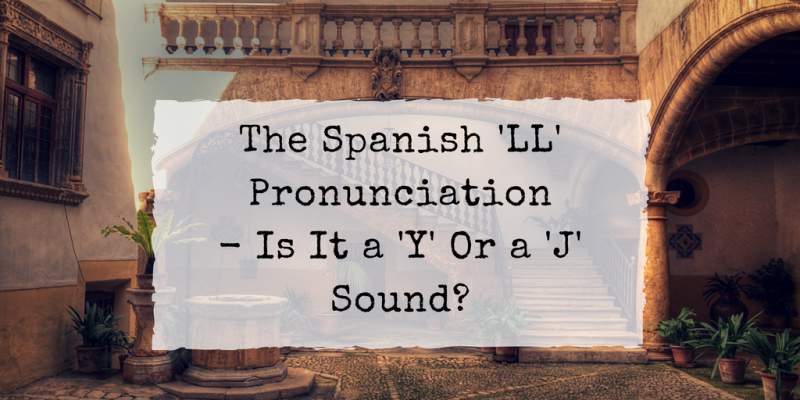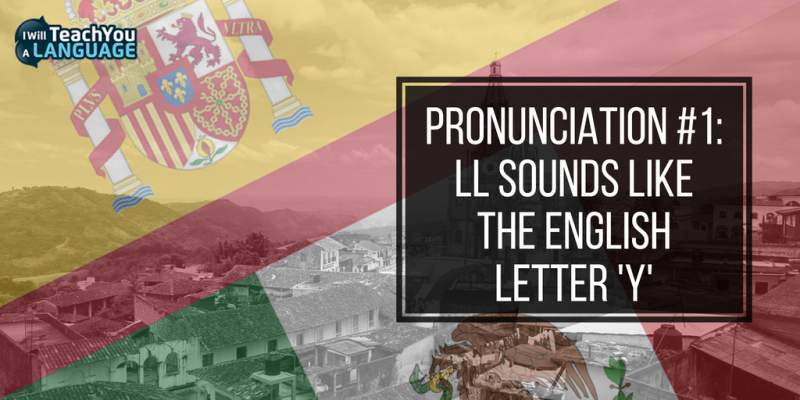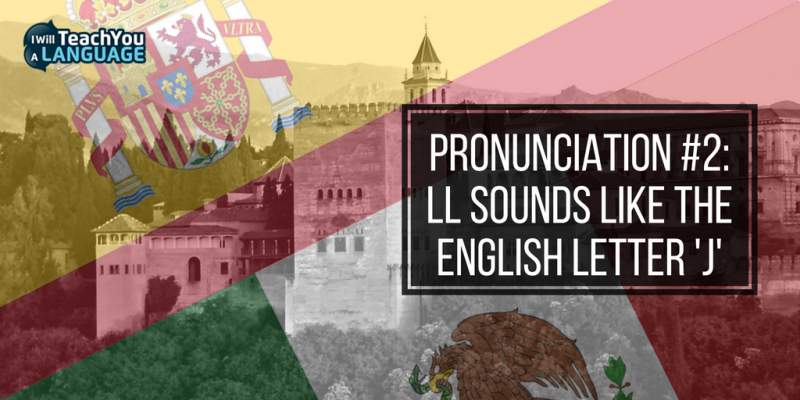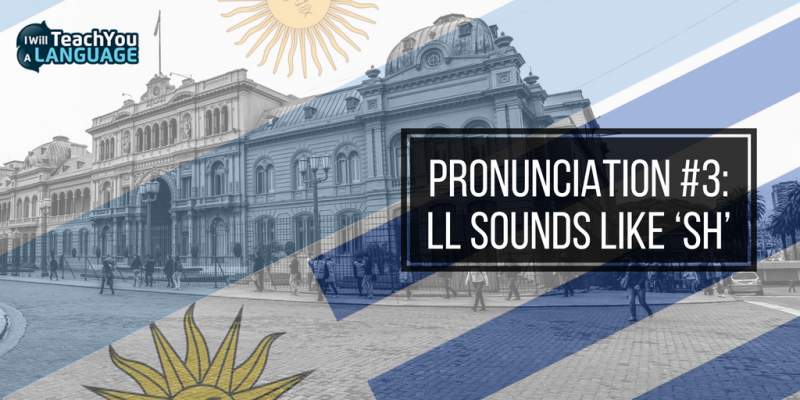How Do You Say I Didnt Know You Were Coming in Spanish

When you start started to learn Spanish, you were probably taught that the SpanishLL pronunciation was the same as the letter 'y' in English.
And that is true… sometimes.
But, if you've already been learning Spanish for a little while, I bet y'all've discovered that's non e'er the case.
Mayhap you're wondering whyll sometimes sounds like 'y', but other times seems to sound like an English 'j' instead.
Or perhaps y'all've been to Argentina or Uruguay and you could swear they're actually making a 'sh' audio when they employ the Spanish ll.
So which of these sounds is it?
Well, believe it or not, there are really four different ways to pronounce the Spanish LL sound in words like llamar and lluvia around the Castilian-speaking globe.
And in this article, you lot're going to learn about each one of them.
For a quick walkthrough the unlikell sounds in Castilian, you can check out this video from my Fluent Spanish University YouTube aqueduct. Or if you prefer a more thorough explanation of the Spanish ll or merely prefer to encounter information technology in print, whorl down and read on!
By the way, if you want to larn Spanish through stories, not rules, my acme recommendation for language learners is my Uncovered courses, which teach yous through StoryLearning®.Click here to observe out more and get a gratuitous trial of the method.
The Castilian LL Sound – A Background
Equally you've probably realised, ll is very mutual in Spanish!
Rather beingness a divide letter in the Spanish alphabet, ll is what'southward known as a digraph.
Put simply, this ways it'southward a combination of two letters representing a single sound.
Nosotros also have digraphs in English such equally sh, th, and ck.
But, when yous're learning to speak and empathise Spanish, you probably care more about how to pronounce this sound than what it'due south called!
And so permit's go to that…
The confusing thing most the Spanish ll is that there are really iv different ways to pronounce it and all of them are correct… somewhere in the world!
To fully understand what I mean, let me break each variation for yous, one-by-one:
Pronunciation 1: LL Sounds Like The English Letter 'Y'

Merely as you learned in your beginner course or textbook, ll about often sounds similar the English letter 'y' equally in the words "yellow" and "yeah".
This is the way ll is pronounced in Spain, parts of United mexican states, and most of Central and South America.
When you are first learning to speak and read Spanish, this is the easiest pronunciation to use. Merely magine replacing any ll with a 'y' and that'south information technology!
For instance, you would pronounce lluvia (rain) every bit "yuvia" or se llama equally "se yama". Here are some other mutual ll words and their pronunciations:
- llave (cardinal) – yave
- bella (beautiful) – beya
- amarillo (yellowish) – amariyo
- llegar (to make it) – yegar
- llenar (full) – yenar
- cuchillo (knife) – cuchiyo
- ella (she) – eastya
- lluvia (rain) – yuvia
- pollo (chicken) – poyo
- toalla (towel) – toaya
- llorar (to cry) – yorar
This is the most common pronunciation worldwide and it'due south too the way nearly Spanish teachers volition teach new Spanish speakers to pronounce ll.
Ll is taught as 'Y' for good reason: since it's the most mutual pronunciation, it'south the most useful way for Spanish learners to larn to speak and empathize the language quickly.
By mastering nothing more than this pronunciation of ll, yous will exist readily understood past the majority of hispanohablantes (Spanish speakers) effectually the earth.
That said, while knowing the standard ll= 'y' pronunciation is a dandy first, if you've done much traveling or know many native Spanish speakers, you've probably already heard two other mutual pronunciations of ll.
Let's consider those adjacent…
Pronunciation two: LL Sounds Like The English Letter 'J'

The second most common pronunciation of ll is similar to a soft 'J' sound in English.
This variation tin can be heard regionally effectually the world rather than in any 1 particular country.
So, instead of "poyo" (pollo)or "yuvia" (lluvia), equally in the examples above, you'll hear "pojo" or "juvia."
It's important to note that this soft 'j' is non quite the aforementioned every bit the difficult, fast J of English words like "jam".
In fact, it's well-nigh closer to the 'S' in the English give-and-take "treasure" but stretched out a bit longer: jjjorar (llorar) or jjjave (llave).
Pronunciation 3: LL Sounds Like 'Sh' (Río de la Plata Spanish)

Another mode yous may hear ll pronounced is similarly to a 'sh' sound in English.
In this variation, tortilla becomes "tortisha" and llamar is "shamar".
Ll as "sh" is virtually sectional to the Río de la Plata region of South America, which includes Argentina and Uruguay.
If you've ever spoken to someone from Argentina, you'll probably have noticed this sound earlier.
Many things nearly Spanish are different in the Rio de la Plata region. In fact, in that location is a word (Rioplatense) that describes that region's Spanish.
In add-on to pronouncing ll differently than the rest of the Spanish-speaking world, Rioplatense Spanish has its own special conjugation for the singular tú forms of verbs and lots of distinct vocabulary.
The Ll as 'sh' is probably the most distinct variation in the Spanish speaking world and it can exist very confusing for new Spanish speakers who aren't aware of it.
But now that you know information technology exists and how it sounds, you won't have much of a trouble!
In truth, unless yous will exist living in either Argentina or Uruguay, y'all probably don't demand to worry nearly pronouncing your ll this way.
Only, no matter where you learn and speak Spanish, it'south a good idea to be familiar with this pronunciation anyway so you won't be caught off guard if others use it when speaking to you!
Is 'LL' The Same As 'Y' in Spanish?
Traditionally, the lettersll and y had dissimilar pronunciations in Castilian.
However, nowadays, in most Spanish-speaking countries, the ll in pollo is pronounced the same way as the y in arroyo.
This is truthful with whatever of the three variations of ll we've learned virtually and so far.
For example:
- Someone who uses the ll as a soft 'j' audio would say "pojo" (pollo) and "arrojo" (arroyo)
- Argentineans and Uruguayans would say "posho" (pollo) and "arrosho" (arroyo)
In a few parts of the world, however, ll and y take maintained slightly different pronunciations.
The stardom might exist difficult to hear unless you're listening for information technology specifically, but ll is actually pronounced every bit a combination of the letters 'l' and 'i', as in the English word "one thousand thousand".
If you are familiar withItalian pronunciation, you can also retrieve of it as the "gli" sound used in words like famiglia or svegliare.
And then, what does this pronunciation sound like?
Well, instead of pollo, yous would hear "polyo", while approach would remain "arroyo".
This may seem pretty strange to you as a Castilian learner simply it does accept one major advantage – it makes it easy to distinguish between words that contain ll and words that include a y instead, which helps when learning to spell Spanish words correctly!
This pronunciation (sometimes known as lleísmo) is particularly mutual in isolated Spanish-speaking communities, such as amongst Spanish speakers in the Philippines and in parts of Colombia, Paraguay, Bolivia, and Peru.
Which Spanish LL Pronunciation Should You Use?
So which Castilian llpronunciation is the best?
To be honest, there is no best or worst way to say ll.
Y'all may find that one pronunciation is easier or comes more naturally to you lot. Only more likely, the ll you choose will depend on where you alive, the people you speak with regularly and your reasons for learning Spanish.
In the end, information technology doesn't really thing which Spanish ll sound you choose to use. Afterwards all, using and enjoying your Spanish is far more important than focusing on any specific variation!
Source: https://storylearning.com/learn/spanish/spanish-tips/spanish-ll-pronunciation
0 Response to "How Do You Say I Didnt Know You Were Coming in Spanish"
Post a Comment